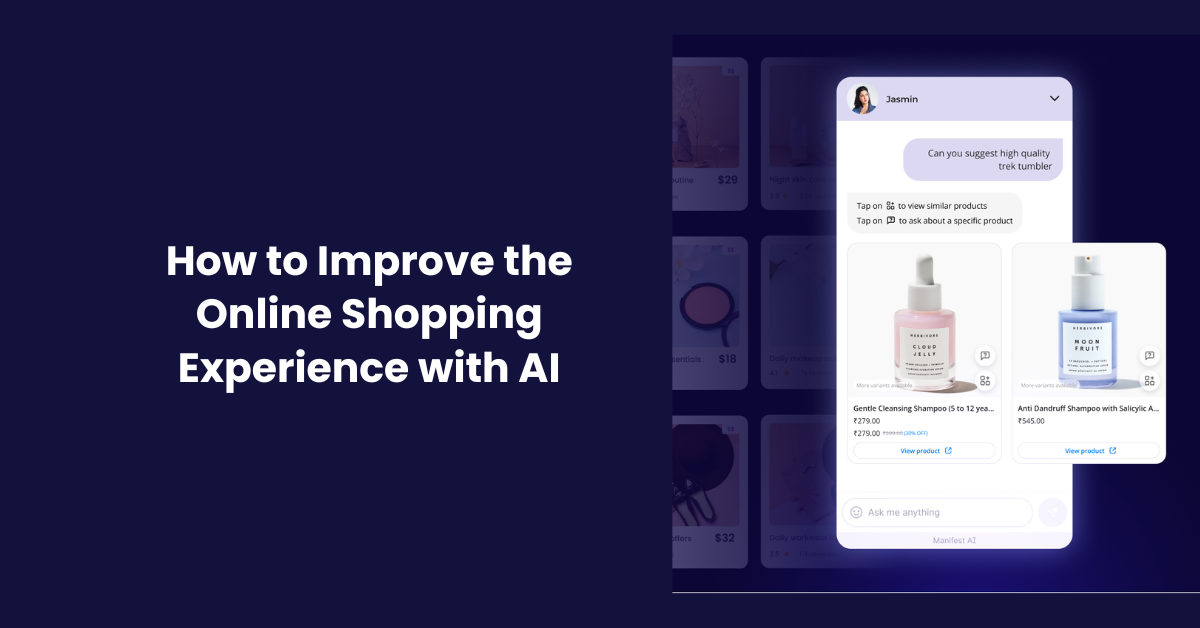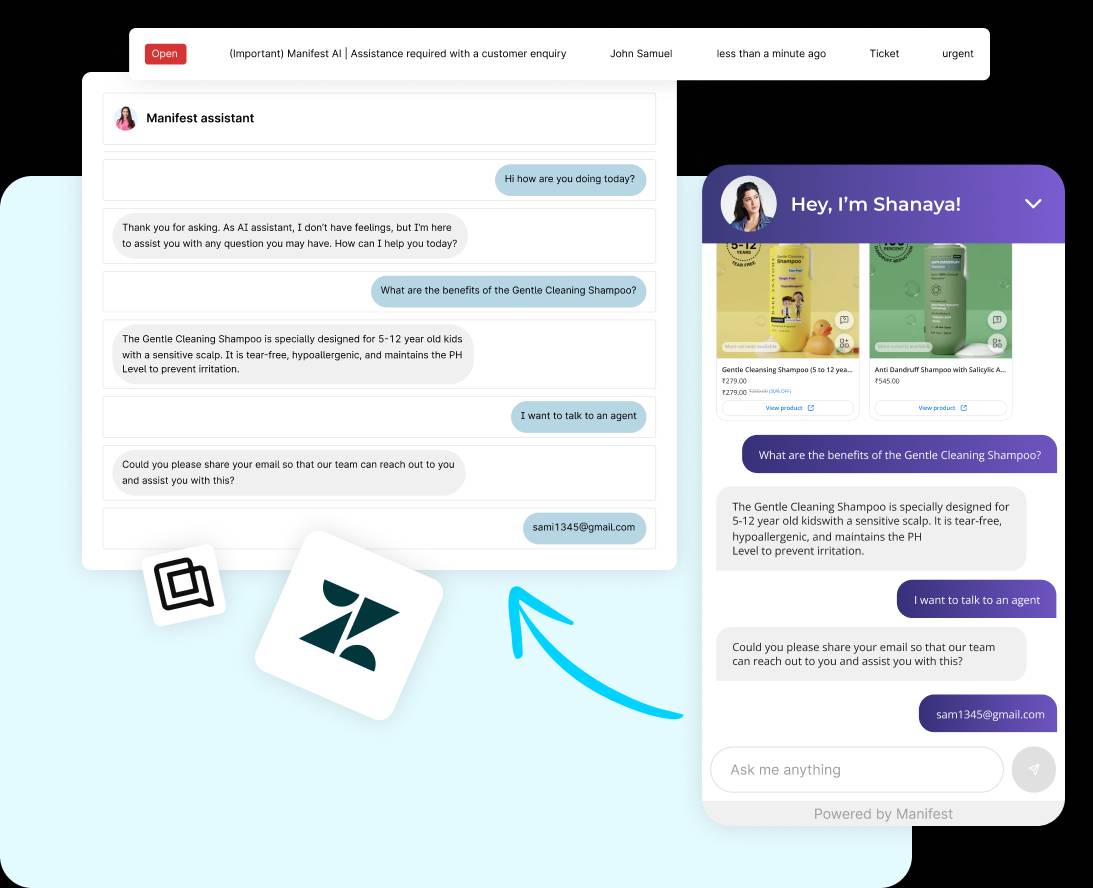How to Improve the Online Shopping Experience with AI

Artificial intelligence (AI) is revolutionizing the online shopping experience by enhancing personalization, customer support, and overall efficiency. By leveraging AI technologies, eCommerce platforms can offer tailored product recommendations, instant query resolution, and a smoother shopping journey. This not only improves customer satisfaction but also drives higher conversion rates and sales.
In this blog, we'll explore how AI can be used to create a better online shopping experience, from personalized recommendations to advanced customer support, ensuring that your eCommerce site meets and exceeds customer expectations.
What makes a good Online Shopping Experience?

A personalized online shopping experience is crucial for customer satisfaction and repeat business. Here are key elements that contribute to an excellent online shopping journey:
1. User-Friendly Website Design
- Ease of Navigation: A well-structured website with intuitive navigation allows customers to find products quickly and easily. Clear categories, a search bar, and filters enhance the browsing experience.
- Responsive Design: The website should be optimized for all devices, including desktops, tablets, and smartphones. A responsive design ensures a seamless experience across various screen sizes.
2. High-Quality Product Images and Descriptions
- Visual Appeal: High-resolution images from multiple angles help customers get a better view of the product. Zoom functionality and videos can further enhance understanding.
- Detailed Descriptions: Comprehensive product descriptions that include size, material, features, and usage instructions inform customers and reduce uncertainty.
3. Personalized Recommendations
- Tailored Suggestions: Using customer data to provide personalized product recommendations can enhance the shopping experience. Suggesting related products or alternatives based on browsing history can lead to higher satisfaction and sales.
4. Efficient Search and Filtering Options
- Effective Search Function: A robust search function that returns accurate results is essential. Features like autocomplete and typo correction can improve search efficiency.
- Advanced Filtering: Filters for size, color, price, and other attributes help customers narrow down their choices quickly.
5. Easy and Secure Checkout Process
- Streamlined Checkout: A simple, multi-step checkout process reduces cart abandonment. Allowing guest checkout and saving payment details for future purchases can enhance convenience.
- Security: Ensuring that payment gateways are secure builds trust with customers. Displaying security badges and providing multiple payment options can reassure customers.
6. Responsive Customer Support
- Various Support Channels: Offering multiple channels for customer support, such as live chat, email, and phone, ensures that customers can get help when needed.
- AI and Chatbots: AI-powered chatbotsfor can provide instant answers to common questions, improving response times and customer satisfaction.
7. Transparent Policies
- Clear Return Policy: A straightforward return and refund policy helps customers feel confident about their purchases. Displaying this information prominently on the website is crucial.
- Shipping Information: Providing clear details about shipping costs, delivery times, and tracking options ensures customers know what to expect.
8. Fast Loading Times
- Performance Optimization: Ensuring that the website loads quickly prevents customers from leaving due to slow performance. Optimizing images and using efficient coding practices can help achieve this.
5 Ways to Improve the Shopping Experience of Customers Online Using AI
Using Manifest AI, eCommerce businesses can significantly enhance customer experience in online shopping.
Manifest AI is an AI Shopping Assistant for Shopify stores which has already provided the best online shopping experience for the past 8 months to 2000+ brands.
Here are five ways to achieve this:
1. AI Shopping Pages
AI Shopping Pages are personalized landing pages designed to enhance the shopping experience for each visitor. These pages use advanced AI algorithms to analyze browsing behavior, purchase history, and preferences. By doing so, they offer tailored product recommendations and relevant content, making the shopping experience more engaging and efficient.
Example: Imagine a customer visiting an online clothing store. Upon arrival, the AI Shopping Page answers customer requirements & recommends the right products even recognizing the customer's past interactions and preferences. The page dynamically showcases outfits and accessories that align with their style and previous purchases. This personalized approach not only makes it easier for the customer to find products they like but also increases their satisfaction and likelihood of making a purchase, ultimately driving higher sales for the store.
2. AI Powered Support

AI-powered support provides instant, around-the-clock assistance, answering customer queries and resolving issues without human intervention.
Example: An electronics store uses an AI chatbot to handle customer inquiries about product specifications, warranty details, and troubleshooting steps. Customers receive quick and accurate responses at any time of the day, enhancing their overall shopping experience and building trust in the brand.
3. Interactive Nudges

Interactive AI nudges engage customers throughout their shopping journey by offering timely suggestions, reminders, and offers to enhance their shopping experience and encourage purchases.
Example: A home decor store uses interactive nudges to remind customers of items left in their cart, suggest complementary products, and offer limited-time discounts while they browse. These nudges guide customers towards completing their purchase and discovering additional items they might like, boosting engagement and sales.
4. Real-Time Quizzes

Real-time quizzes dynamically adjust to customer inputs, providing immediate, tailored product recommendations.
Example: An online fitness equipment retailer offers a real-time quiz that asks customers about their fitness goals, workout preferences, and available space. As the customer answers, the AI instantly updates the product suggestions, offering equipment that best fits their requirements. This interactive and personalized approach makes it easier for customers to find suitable products quickly.
5. Personalized Search & Recommendation

Personalized search and recommendation systems analyze customer behavior to provide relevant search results and product suggestions, improving the shopping experience.
Example: A bookstore uses AI to enhance its search functionality. When a customer searches for a specific book, the AI not only provides relevant search results but also suggests similar books based on the customer's previous purchases and browsing history. This personalized approach helps customers discover new books that align with their interests, increasing the likelihood of additional purchases.
Conclusion
Leveraging AI can significantly enhance the digital shopping experience by providing personalized support, recommendations, and interactive engagement. Implementing AI Shopping Pages, AI-powered support, interactive and real-time quizzes, and personalized search functionalities helps create a seamless and enjoyable customer journey. These AI-driven solutions not only improve customer satisfaction but also drive higher conversions and sales. By integrating these advanced technologies, eCommerce businesses can stay competitive and meet the evolving needs of their customers effectively.

.png)
